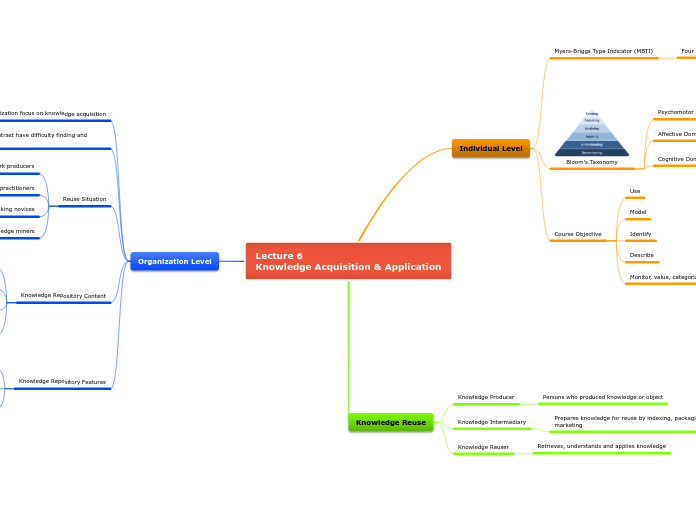Lecture 6
Knowledge Acquisition & Application
Individual Level
Myers-Briggs Type Indicator (MBTI)
Four Dimensions of Personality Type
Interest
Extroversion - Introversion
Perception
Sensing - Intuition
Judgement
Thinking - Feeling
Environment
Judgement - Perception

Bloom's Taxonomy
Psychomotor Skills
perception, set, guided, response
Affective Domain
receiving phenomena, responding to phenomena
Cognitive Domain
knowledge comprehension, application, analysis, synthesis and evaluation
Course Objective
Use
Model
Identify
Describe
Monitor, value, categorize, report
Knowledge Reuse
Knowledge Producer
Persons who produced knowledge or object
Knowledge Intermediary
Prepares knowledge for reuse by indexing, packaging, marketing
Knowledge Reuser
Retrieves, understands and applies knowledge
Organization Level
Small Organization focus on knowledge acquisition
Large organization in contrast have difficulty finding and reusing knowledge
Reuse Situation
Shared work producers
Shared work practitioners
Expertise-seeking novices
Secondary knowledge miners
Knowledge Repository Content
Factual
terminology, specified details and elements
Conceptual
theories, models, principles and generalizations
Procedural
skills, algorithms, technique and methods
Meta-cognitive
knowledge about knowledge: learning, thinking, problem-solving
Knowledge Repository Features
Links to organizational and external sources
Case studies and histories
Discussion topics
